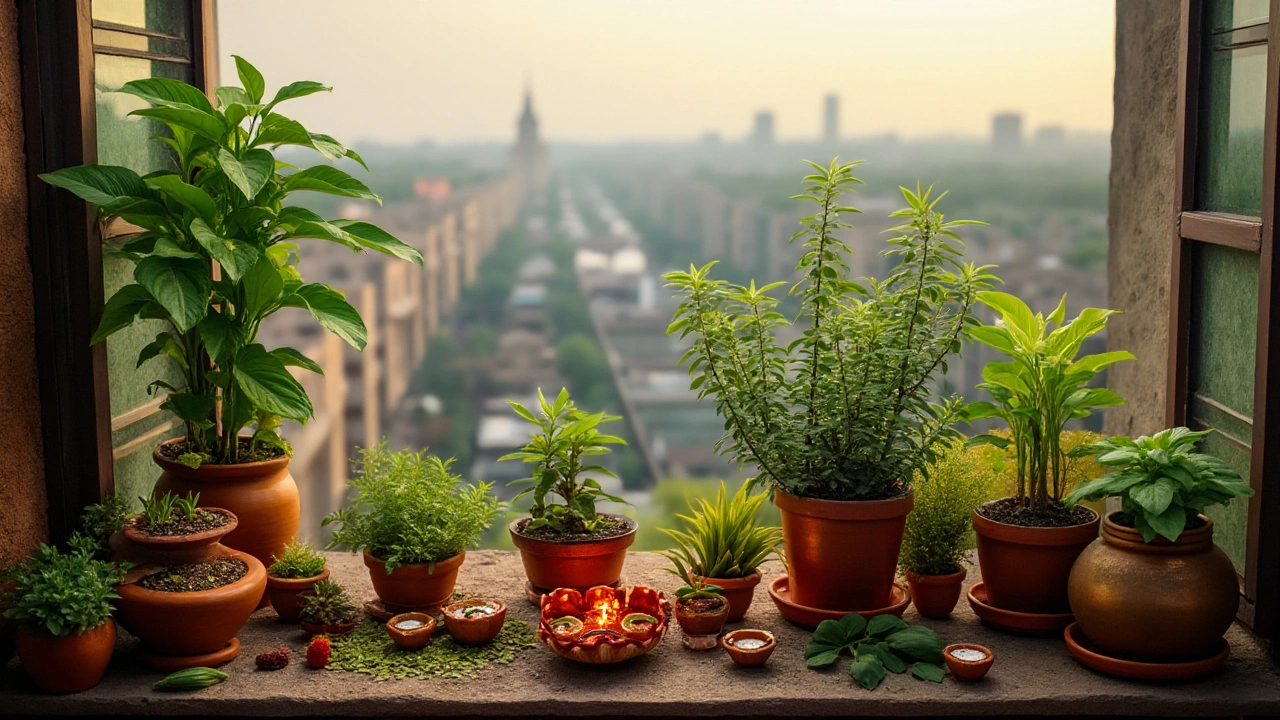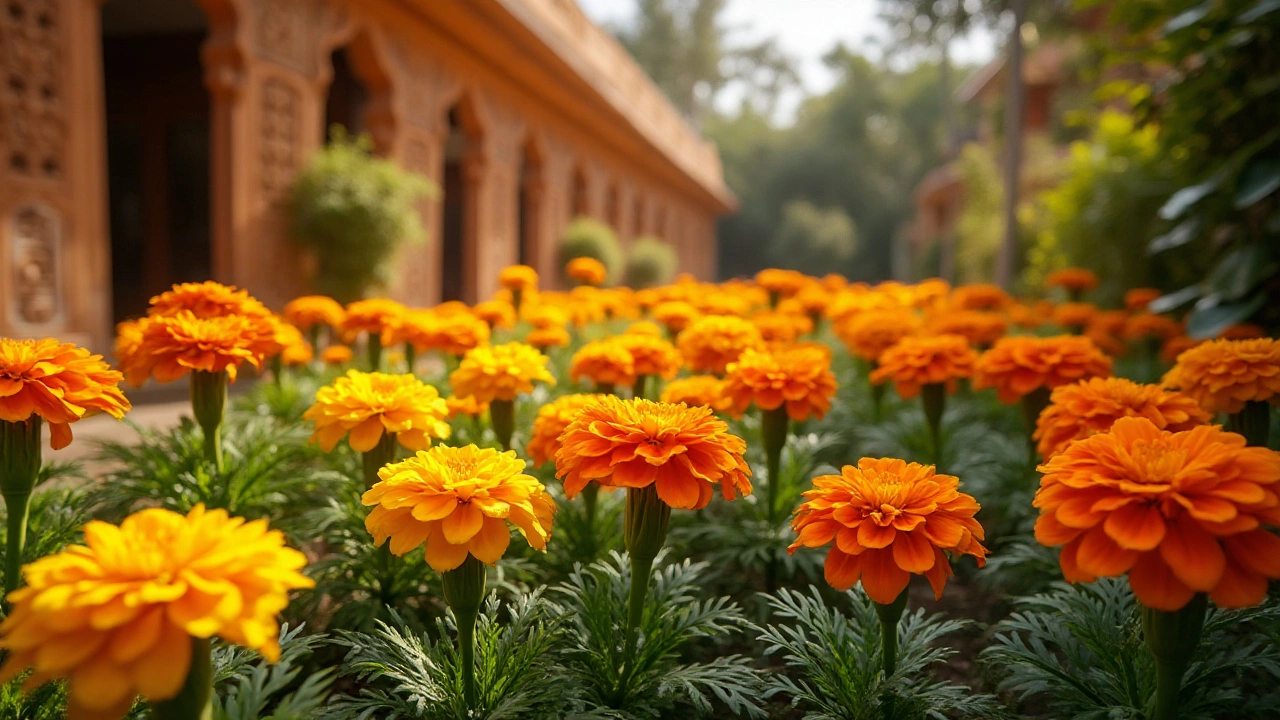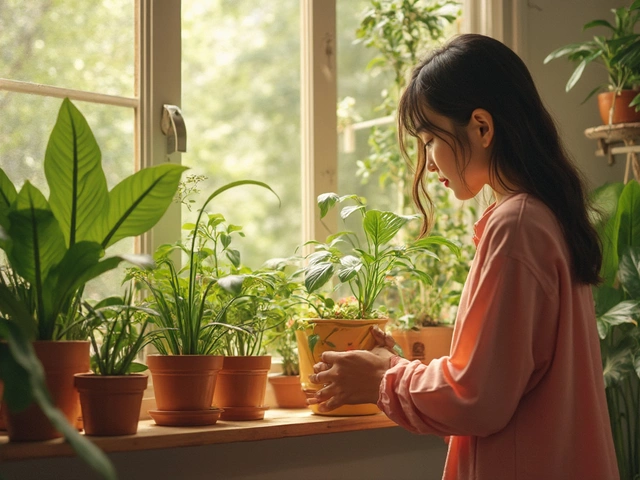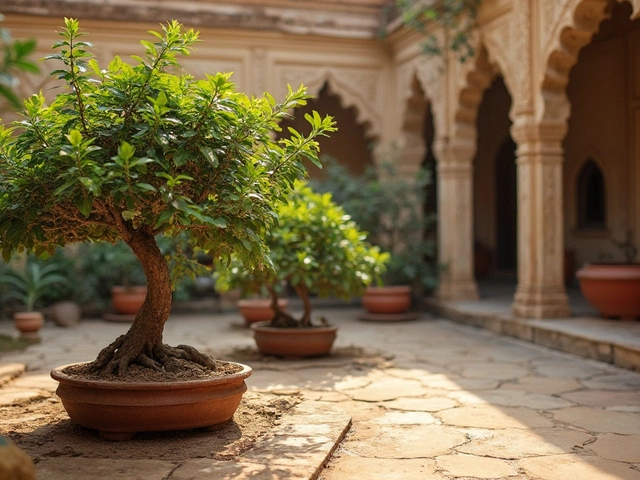In the grand tapestry of India's culture, plants hold an esteemed place, representing life, renewal, and prosperity. Gifting plants has long been a cherished tradition, intertwining with the vibrant festivals and joyous occasions throughout the year. Whether it's a lush indoor plant or a flowering marvel, selecting a suitable plant gift requires a thoughtful understanding of seasons and symbolism.
India's diverse climate zones and rich tapestry of traditions offer a vast selection of plants suitable for gifting. This guide aims to unravel the nuances of choosing the perfect gift plant, delving into cultural meanings and seasonal best picks. Explore the world of Indian greenery with us to make a lasting impression with your next gift.
- Understanding the Cultural Significance of Plants in India
- Seasonal Guides: Best Times to Gift Specific Plants
- Top Plant Choices for Different Indian Festivals
- Caring for Gifted Plants: Tips for Recipients
- The Benefits of Gifting Plants: Health and Happiness
Understanding the Cultural Significance of Plants in India
India, with her bustling cities and serene villages, presents a beautiful mosaic of nature and tradition, where plants are more than just a fleeting embellishment—they are symbols of spiritual depth, cultural narratives, and life’s cycles. The rich agricultural heritage of India, stretching back thousands of years, has naturally bestowed certain plants with meanings deeply resonating across its diverse populace. Take for instance the Tulsi plant, often revered as sacred in Hindu households. It is not just a herb for medicinal tea, but rather worshipped in the courtyard of Indian homes, bridging spirituality with everyday life and serving as a living altar for daily prayers.
The lotus flower, widely celebrated in Indian lore, is another quintessential emblem of purity and enlightenment, often depicted in religious iconography and architectural motifs. Found in every Indian state's emblem and echoing through Hindu, Buddhist, and Jain philosophies, the lotus signifies rebirth and spiritual awakening.
"The lotus grows in mud, yet blooms pure and unstained. It's a reminder of retaining purity amidst worldly chaos," renowned scholar Raj Malhotra elucidated while discussing symbolism in plant life.
Marigolds, with their vibrant hues, fill the air with festive cheer around many Indian festivals. Symbolizing brightness and positivity, these flowers are staples at weddings, celebrations, and rituals for their believed ability to ward off negativity. Not only do these blooms adorn homes and temples, but their presence is also meant to invoke blessings and joy, thus ensuring their continued popularity in decorative garlands and offerings.
Apart from spiritual connotations, many plants in India hold medicinal importance passed down through generations via Ayurveda. Neem, often referred to as the 'village pharmacy', is renowned for its antimicrobial properties. It transcends its utility beyond health, highlighting the interconnectedness of human life with nature in Indian tradition. In fact, many homes have neem and mango trees planted together bringing both shade and ingredients for homemade remedies and culinary use. Recognized across the globe, the ancient system of Ayurveda incorporates myriad local plants into its holistic healing practices, further solidifying their cultural and health-related significance.
Traditional Indian festivals, including Diwali and Navratri, promote the exchange of gift plants such as marigolds and banana leaves not just as decor, but as part of custom and auspicious good fortune. Giving a seasonal plant in India is not merely about aesthetics, but a gesture steeped in goodwill, blessings, and deeper meaning. This deep-rooted tradition reflects not only respect for nature’s bounty but also a profound understanding of life cycles and interconnectedness in Indian ethos.
Understanding these layers of meaning intertwined with each leaf and bloom allows one to appreciate the deeper connection between the flora and culture of India. As we give or receive a gift plant, it becomes a gesture that speaks of hope, prosperity, and a nurturing bond between giver and recipient, embodying myriad meanings within its roots, leaves, and blossoms.
Seasonal Guides: Best Times to Gift Specific Plants
Gifting seasonal plants in India is an art that requires understanding the rhythms of nature and the cultural milestones that dot the calendar. India, with its diverse climates stretching from the Himalayas to the tropical shores, necessitates a careful pick of flora based on the time of year. Each season brings forth a different palette of blooms and greenery, adding a distinct fragrance and hue to the atmosphere. For example, during the spring, the air is filled with the fragrance of colorful marigolds. Not just a sight for sore eyes, these flowers are said to symbolize prosperity and positive energy, making them ideal gifts for weddings and housewarmings.
Summertime calls for something that can thrive in the heat while adding aesthetic value. The majestic hibiscus, with its vibrant red flowers, not only stands the test of scorching temperatures but also holds cultural importance, especially in South Indian rituals. The rainy monsoon season loves plants like the money plant or pothos, which flourish with minimal sunlight and are excellent indoor options to bring nature inside while the outdoors are drenched. The Indian Tulsi, revered for its spiritual significance and medicinal properties, is a perennial favorite, perfect for gifting any time of the year but often favored during festivals such as Diwali for its spiritual resonance.
Winter, though milder in most parts of India than in the West, provides a perfect opportunity to gift hardy plants like succulents. Their elegant structures and ease of maintenance make them great companions for those who may not have a green thumb yet appreciate a touch of nature in their living spaces. As Sir David Attenborough noted, "A world without plants is a world without energy and, eventually, without life..."
Tom York, a respected horticulturist, once said, "Choosing a plant as a gift is like presenting a piece of Earth's art; it breathes life into homes and connects people to the wonder of nature."Knowing which plant thrives during each season not only enhances your gifting but impresses upon the recipient a thoughtful consideration of their ongoing experience with the plant. An excellent reminder of every thoughtful gesture, these living gifts grow alongside the relationships they are intended to nurture.
To reiterate, here’s an easy guide:
- Spring: Marigolds and jasmine for their vibrant colors and uplifting scents.
- Summer: Hibiscus and bougainvillea for their resilience and cultural symbolism.
- Monsoon: Indoor plants like money plant or peace lily.
- Winter: Succulents and ferns for their hardiness and easy care.

Top Plant Choices for Different Indian Festivals
Throughout the year, India bustles with myriad festivals, each adorned with its unique customs and traditions. These celebrations, full of color and vibrancy, provide perfect opportunities to gift plants that resonate with the cultural ethos. Choosing the right plant gift during these festivals not only reflects thoughtfulness but also embraces the spirit of these age-old traditions. Whether it’s the auspicious Diwali or the joyful Holi, plants can amplify the festive mood while adding a touch of green serenity to the celebrations.
During Diwali, the festival of lights, gifting plants like marigolds becomes significant. Marigolds are believed to bring prosperity and drive negativity away with their bright hues and aromatic presence. Apart from marigolds, consider gifting a small pot of basil, or tulsi, as it is revered in Indian households for its religious significance and health benefits. As quoted by the ancient Ayurveda texts,
“No revered act is ever complete without Tulsi, the queen of herbs.”For a more modern touch, a vibrant money plant in a glass jar offers both aesthetic appeal and Feng Shui benefits, making it a popular choice for this festival of wealth and prosperity.
Holi, the festival of colors, is another occasion where plant gifts are cherished. Aligning with nature's awakening, gifting colorful flowering plants like hibiscus or bougainvillea echoes the exuberance of Holi. These plants, with their vivid blossoms, symbolize joy and are perfect for counteracting the dullness of prolonged winters. They’re easy to care for, ensuring even those without a green thumb can enjoy their beauty. A herbal mint plant can also be an invigorating choice, offering a refreshing fragrance along with potential culinary uses that spice up Holi snacks and beverages.
Another significant festival is Raksha Bandhan, a day celebrating the bond between siblings. Here, gifting a potted bamboo plant can be a great way to symbolize strength and resilience. Known as the ‘lucky bamboo’, it's considered to bring good luck when gifted, complementing the sentiments of safety and protection that Raksha Bandhan embodies. Orchids, with their elegance and exotic charm, also serve as an ideal gift, symbolizing love and beauty, attributes cherished in relationships.
During the harvest festival of Pongal, a thoughtful gift like the turmeric plant offers a connection with the earth's bounty. Turmeric is deeply rooted in Indian culture, known for both its culinary and medicinal uses. Its vibrant color also symbolizes good fortune and abundance. A potted rice plant might also be given, representing a blessing for a rich harvest and prosperity, aligning with the festival’s agricultural significance. These botanical selections ensure that your gifts are not just appreciated for their beauty but are woven with cultural relevance.
Caring for Gifted Plants: Tips for Recipients
Receiving a plant as a gift is not just a gesture of love but a responsibility to nurture a living entity. Plants, much like pets, demand attention and care to thrive in their new environments. The joy of seeing a plant flourish under your care is unparalleled, offering a sense of achievement and connection to nature. The first step in caring for your new green companion involves understanding its specific needs. Different plants have different requirements when it comes to light, water, and temperature. Plants like the hardy snake plant can tolerate lower light conditions, whereas vibrant marigolds lover the sun and require a sunny spot to bloom.
Watering routines can vary significantly between species, so it's crucial not to follow a one-size-fits-all approach. Overwatering is one of the most common mistakes, often leading to root rot. It's advisable to allow the soil to dry between waterings for most indoor plants. Your touch will let you know when it's time for the next watering schedule. Alongside proper watering techniques, feeding your plants is equally vital. A liquid fertilizer applied once a month can significantly enhance the plant's growth and vitality. Keep a watchful eye on the plant's foliage to catch early signs of distress or disease, such as yellowing leaves, which could indicate nutrient deficiency or overwatering.
Another aspect of plant care is ensuring they remain pest-free. Regular inspections should become a habit. Most pests can be managed with natural solutions like neem oil or insecticidal soap, which won't harm the plant or the environment. In the words of horticulturist Laura Smith, “The key to successful plant care is observation. Plants tell you what they need, it's just a matter of learning their language.”
"Observation is the simplest yet most effective tool in a plant lover's arsenal," advises Laura Smith, horticulturist.
For those living in urban apartments, limited space and low light can be challenges. Consider opting for hardy varieties like peace lilies or lucky bamboo, which are known for their resilience in less-than-ideal indoor conditions. Ensuring your plants have the right type of pot and soil also makes a huge difference in their growth. Choose pots with adequate drainage to prevent water logging, which is often detrimental.
The emotional benefits of caring for plants are just as rewarding as their physical presence. Studies have shown that tending to plants can reduce stress and promote mental well-being, offering a calm oasis in busy lives. With these tips in hand, recipients of gifted plants can confidently nurture their green companions, ensuring they thrive and bring joy and beauty into their homes.

The Benefits of Gifting Plants: Health and Happiness
Giving plants as gifts is more than just a trend; it's an age-old practice with roots deep in tradition and science. Plants are a symbol of growth, optimism, and tenacity, mirroring the beauty and resilience found in nature itself. When choosing a gift, plants have the unique ability to enrich and transform living spaces, providing both aesthetic pleasure and tangible wellness benefits. Research shows that having indoor plants can significantly improve air quality by absorbing toxins and releasing oxygen. For instance, the peace lily is renowned for its ability to filter out formaldehyde and benzene, common indoor pollutants.
Beyond environmental benefits, having plants in one's home has profound psychological effects. Studies have demonstrated that indoor plants can reduce stress levels and improve overall mood. The sight of green foliage has a calming effect, which can enhance mental clarity and concentration. The act of caring for a plant, watching as it grows and blossoms, can also impart a sense of accomplishment and responsibility, promoting positivity. In busy urban landscapes, where space and nature can be scarce, a touch of greenery can serve as a vital connection to the natural world.
Emotional Connections and Cultural Importance
The emotional impact of plant gifting should not be underestimated either. In Indian culture, certain plants hold specific meanings and are intertwined with tradition. The sacred tulsi plant, for example, is not only revered for its religious significance but is also praised for its health benefits. It's often gifted during festive occasions as a blessing of prosperity and health. Similarly, the gifting of bamboo is associated with luck and wealth. It's this rich tapestry of cultural symbolism that adds layers of meaning to the simple act of giving a plant, making it a gesture filled with thought and love.
"The addition of even one plant to your home or work space can dramatically lift spirits and instill a sense of peace," says Dr. Pradeep Nayar, a renowned botanist with extensive research in plant therapy.
Moreover, gifting plants aligns with sustainable living practices. The world is increasingly aware of environmental footprints, and plants are a gift that emphasizes eco-friendliness. Unlike material gifts that may be short-lived or contribute to wastage, plants thrive, reduce carbon footprints, and offer an enduring reminder of the giver. This alignment with sustainable practices not only benefits the planet but reflects a thoughtful, conscious approach to gifting.
In summary, the act of gifting plants in India, whether it be gift plants or seasonal plants India, transcends cultural aesthetics and enters the realm of promoting health and happiness. Its benefits—ranging from improved air quality and mental well-being to cultural significance and environmental consciousness—mark it as a truly valuable gift. As more people recognize these benefits, gifting plants represents a harmony with nature and a wish for prosperity and happiness for loved ones.





